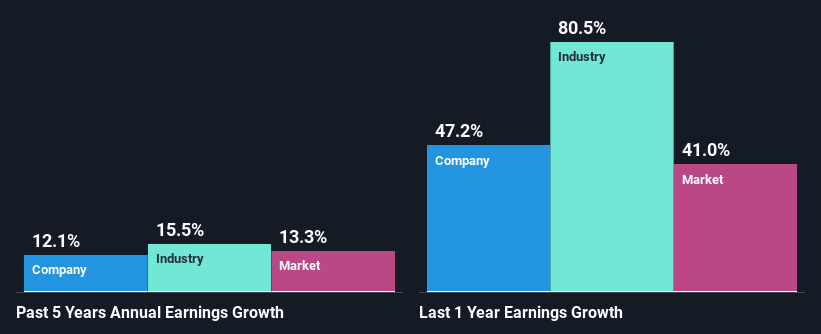Texas Instruments Incorporated's (NASDAQ:TXN) Has Had A Decent Run On The Stock market: Are Fundamentals In The Driver's Seat?
Texas Instruments' (NASDAQ:TXN) stock is up by 3.7% over the past month. Given that stock prices are usually aligned with a company's financial performance in the long-term, we decided to investigate if the company's decent financials had a hand to play in the recent price move. Specifically, we decided to study Texas Instruments' ROE in this article.
Return on equity or ROE is a key measure used to assess how efficiently a company's management is utilizing the company's capital. In other words, it is a profitability ratio which measures the rate of return on the capital provided by the company's shareholders.
View our latest analysis for Texas Instruments
How Is ROE Calculated?
The formula for ROE is:
Return on Equity = Net Profit (from continuing operations) ÷ Shareholders' Equity
So, based on the above formula, the ROE for Texas Instruments is:
60% = US$7.3b ÷ US$12b (Based on the trailing twelve months to September 2021).
The 'return' is the yearly profit. Another way to think of that is that for every $1 worth of equity, the company was able to earn $0.60 in profit.
Why Is ROE Important For Earnings Growth?
We have already established that ROE serves as an efficient profit-generating gauge for a company's future earnings. Based on how much of its profits the company chooses to reinvest or "retain", we are then able to evaluate a company's future ability to generate profits. Assuming everything else remains unchanged, the higher the ROE and profit retention, the higher the growth rate of a company compared to companies that don't necessarily bear these characteristics.
Texas Instruments' Earnings Growth And 60% ROE
Firstly, we acknowledge that Texas Instruments has a significantly high ROE. Second, a comparison with the average ROE reported by the industry of 16% also doesn't go unnoticed by us. This probably laid the groundwork for Texas Instruments' moderate 12% net income growth seen over the past five years.
We then compared Texas Instruments' net income growth with the industry and found that the company's growth figure is lower than the average industry growth rate of 15% in the same period, which is a bit concerning.
The basis for attaching value to a company is, to a great extent, tied to its earnings growth. What investors need to determine next is if the expected earnings growth, or the lack of it, is already built into the share price. By doing so, they will have an idea if the stock is headed into clear blue waters or if swampy waters await. Is TXN fairly valued? This infographic on the company's intrinsic value has everything you need to know.
Is Texas Instruments Making Efficient Use Of Its Profits?
While Texas Instruments has a three-year median payout ratio of 56% (which means it retains 44% of profits), the company has still seen a fair bit of earnings growth in the past, meaning that its high payout ratio hasn't hampered its ability to grow.
Additionally, Texas Instruments has paid dividends over a period of at least ten years which means that the company is pretty serious about sharing its profits with shareholders. Our latest analyst data shows that the future payout ratio of the company over the next three years is expected to be approximately 58%. As a result, Texas Instruments' ROE is not expected to change by much either, which we inferred from the analyst estimate of 54% for future ROE.
Summary
In total, it does look like Texas Instruments has some positive aspects to its business. The company has grown its earnings moderately as previously discussed. Still, the high ROE could have been even more beneficial to investors had the company been reinvesting more of its profits. As highlighted earlier, the current reinvestment rate appears to be quite low. Having said that, the company's earnings growth is expected to slow down, as forecasted in the current analyst estimates. To know more about the company's future earnings growth forecasts take a look at this free report on analyst forecasts for the company to find out more.
This article by Simply Wall St is general in nature. We provide commentary based on historical data and analyst forecasts only using an unbiased methodology and our articles are not intended to be financial advice. It does not constitute a recommendation to buy or sell any stock, and does not take account of your objectives, or your financial situation. We aim to bring you long-term focused analysis driven by fundamental data. Note that our analysis may not factor in the latest price-sensitive company announcements or qualitative material. Simply Wall St has no position in any stocks mentioned.
Have feedback on this article? Concerned about the content? Get in touch with us directly. Alternatively, email editorial-team (at) simplywallst.com.

 Yahoo Finance
Yahoo Finance 
